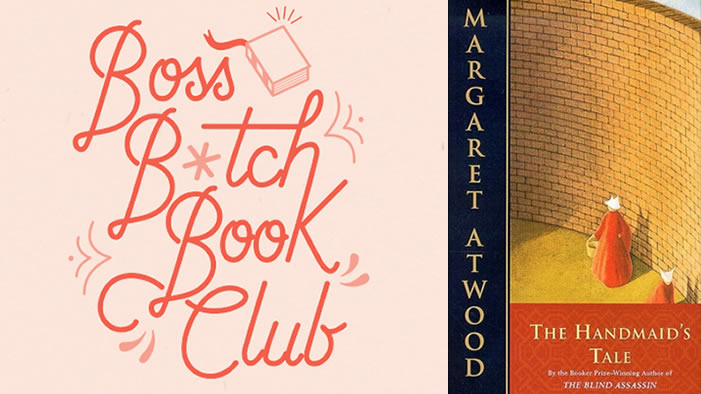Boss B*tch Book Club: Handmaid’s Tale, Week One

- I love this book so much. Thank you for giving me a reason to read it for the 5th time. Just have to read it like 50 more times and it’ll be close to passing The Black Stallion for the book I’ve read the most.
- In my super-over-eagerness to be discussing this book with you, I’m going to throw a lot of questions at you below. Don’t let me scare you away!!! Pick up the ones that interest you; ignore the ones that don’t; ask the ones I forgot to ask. This is YOUR bookclub.
- Ready?
I. Names and Titles
We learned to whisper almost without sound. In the semidarkness, we could stretch out our arms, when the Aunts weren’t looking, and touch each other’s hands across space. We learned to lipread, our heads flat on the beds, turned sideways, watching each other’s mouths. In this way we exchanged names, from bed to bed.
Alma. Janine. Dolores. Moira. June. (p. 4)
Names. All that—all the secrecy, the risk, the time spent learning to communicate—devoted to exchange names. Their names. Not even the names of their latest crush. It is as if, in this new world, in Gilead, the names themselves have become not simply secrets, but powerful ones. What’s going on here? Who are these women and why are their names being treated like confidential, top-secret, super-valuable material? I guess, more broadly, I want us to think about what it mean to have a name—and what does it mean to be nameless?
The handmaid’s names have been taken away, but they’ve been given new ones. There’s Offred (our invaluable narrator), Ofglen, Ofwayne, Ofwarren… What do you notice about these names? (Hint: look closely at the first two letters.)
Names have been replaced by a system of ranking, a system of titles. The dudes are known by their military rank (Commanders, Guardians), while the women are defined by…er…well, what are the women defined by? There are the Wives (wives, mostly decorative), the Handmaids (for well, you’ll see; also grocery shopping), the Marthas (for cooking/cleaning), and the Econowives (for all of the above)…so…hmm…you tell me what defines these roles. And while you’re at it, would you be down to be a lady in Gilead? Do any of these women seem happy???? Or, for that matter, do any of the dudes???
II. Language & Control
Dystopian novels often examine the connection between a state’s repression of its subject and its distortion of language—think of “newspeak” in Orwell’s 1984 or all the weird slang in A Clockwork Orange—and Handmaid’s Tale is no exception. As a writer, I love this book for that reason; start paying attention to it and you’ll see just how frequently Offred is thinking about words and their uses. We’ve talked about names, but what are other ways in which language is being remade or controlled? Is language censored? Who’s allowed to read? And what, aside from the titles (Econowives, Handmaids, Marthas), are the other elements specific to this world?—ones like “Gender Treachery”? And—one last step to this multi-layered cake of a question—how does what they’re called, how does their name, affect how these elements, these actions or things, are perceived?
III. Offred & the Time Before
Offred is our narrator, but how much do we know about her? What adjectives would you use to describe her? What do we know so far about her past? Where does she come from? What was her life like? Would you want to be her friend?
She frequently talks “then” or “the Time Before”—what was that time, exactly? Let’s take a look at a moment where she refers back to that time, to “then”:
Women were not protected then.
I remember the rules, rules that were never spelled out but that every woman knew: Don’t open your door to a strange, even if he says he is the police. Make him slide his ID under the door. Don’t stop on the road to help a motorist pretending to be in trouble. Keep the locks on and keep going. If anyone whistles, don’t turn to look. Don’t go into a laundromat, by yourself, at night.
…Now we walk along the same street, in red pairs, and no man shouts obscenities at us, speaks to us, touches us. No one whistles. (ch. 5, p 24)
Again: what is Time Before? Does it sound familiar? And, again: would you want to be a woman in Gilead? Is there anyway in which women have it better in Gilead than in the Time Before?
How does Offred seem to feel as a woman in Gilead? Does she think her life is markedly better or worse or do the positives and negatives even themselves out? Does she feel more free?
IV. Your turn!
What did I leave out that you really, really wanted to talk about? What’s confusing / weird / disturbing? What’s been your favorite scene so far? Your least favorite? What do you think, in that last chapter we read (13), Offred is waiting for?
Next week: read up to Part X: Soul Scrolls.












